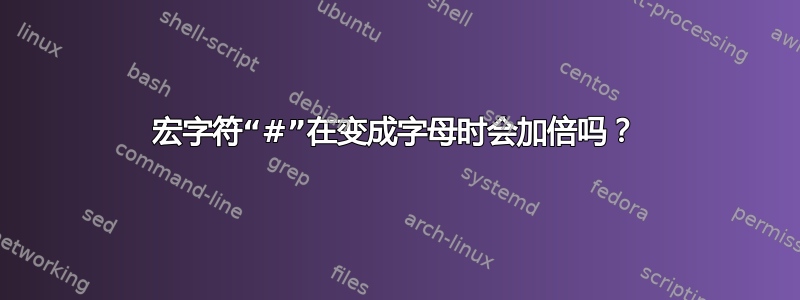
如果我创建了一个接受一个参数的命令,并且该参数应该被允许将未转义的默认宏 char:#作为参数,然后将其视为字母:
\documentclass{article}
\makeatletter
\def\allowhash#1{
{\toks@{#1}\catcode`\#11\relax\scantokens\expandafter{\the\toks@}}%
}
\makeatother
\begin{document}
\allowhash{One hash: #, not two}
\end{document}
上面的代码可以正常工作,只是会打印以下内容:
One hash: ##, not two。这是预期的行为吗?如何修复此问题?
答案1
让我们看看你的代码:
\documentclass{article}
\makeatletter
\def\allowhash#1{
{\toks@{#1}\catcode`\#11\relax\scantokens\expandafter{\the\toks@}}%
}
\makeatother
\begin{document}
\allowhash{One hash: #, not two}
\end{document}
LaTeX 确实获取了 的参数\allowhash,从而根据正常类别代码机制对构成该参数的标记进行标记化。因此,LaTeX 确实获取了类别代码为 6(参数)的显式哈希字符标记作为 的\allowhash参数的组成部分。
在扩展的时候\allowhash,这个 token 就成为 内容的一部分\toks@。
因此\toks@包含类别代码 6(参数)的显式哈希字符标记。
由于\expandafter...\the-trickery,此类别代码为 6(参数)的显式哈希字符标记最终成为了的组成⟨general text⟩部分\scantokens。
\scantokens模拟将标记从其自身写入⟨general text⟩文件并从文件中读回它们,从而根据当前类别代码制度对事物进行标记。
写入文件或屏幕时,类别代码 6(参数)的显式字符标记会加倍。
\scantokens因此,哈希值因未扩展的写入部分而加倍。
我只能即兴地提供一个例程\ReplaceEveryHash,它接受一个参数并用其字符串化替换参数的每个显式 catcode-6-character-token - 这种机制不仅对显式 catcode-6-hashes 起作用,而且对所有显式 catcode-6-character-token 起作用。
\documentclass{article}
\makeatletter
%%=============================================================================
%% Paraphernalia:
%% \UD@firstoftwo, \UD@secondoftwo,
%% \UD@PassFirstToSecond, \UD@Exchange, \UD@removespace
%% \UD@CheckWhetherNull, \UD@CheckWhetherBrace,
%% \UD@CheckWhetherLeadingSpace, \UD@ExtractFirstArg
%%=============================================================================
\newcommand\UD@firstoftwo[2]{#1}%
\newcommand\UD@secondoftwo[2]{#2}%
\newcommand\UD@PassFirstToSecond[2]{#2{#1}}%
\newcommand\UD@Exchange[2]{#2#1}%
\newcommand\UD@removespace{}\UD@firstoftwo{\def\UD@removespace}{} {}%
%%-----------------------------------------------------------------------------
%% Check whether argument is empty:
%%.............................................................................
%% \UD@CheckWhetherNull{<Argument which is to be checked>}%
%% {<Tokens to be delivered in case that argument
%% which is to be checked is empty>}%
%% {<Tokens to be delivered in case that argument
%% which is to be checked is not empty>}%
%%
%% The gist of this macro comes from Robert R. Schneck's \ifempty-macro:
%% <https://groups.google.com/forum/#!original/comp.text.tex/kuOEIQIrElc/lUg37FmhA74J>
\newcommand\UD@CheckWhetherNull[1]{%
\romannumeral0\expandafter\UD@secondoftwo\string{\expandafter
\UD@secondoftwo\expandafter{\expandafter{\string#1}\expandafter
\UD@secondoftwo\string}\expandafter\UD@firstoftwo\expandafter{\expandafter
\UD@secondoftwo\string}\expandafter\expandafter\UD@firstoftwo{ }{}%
\UD@secondoftwo}{\expandafter\expandafter\UD@firstoftwo{ }{}\UD@firstoftwo}%
}%
%%-----------------------------------------------------------------------------
%% Check whether argument's first token is a catcode-1-character
%%.............................................................................
%% \UD@CheckWhetherBrace{<Argument which is to be checked>}%
%% {<Tokens to be delivered in case that argument
%% which is to be checked has leading
%% catcode-1-token>}%
%% {<Tokens to be delivered in case that argument
%% which is to be checked has no leading
%% catcode-1-token>}%
\newcommand\UD@CheckWhetherBrace[1]{%
\romannumeral0\expandafter\UD@secondoftwo\expandafter{\expandafter{%
\string#1.}\expandafter\UD@firstoftwo\expandafter{\expandafter
\UD@secondoftwo\string}\expandafter\expandafter\UD@firstoftwo{ }{}%
\UD@firstoftwo}{\expandafter\expandafter\UD@firstoftwo{ }{}\UD@secondoftwo}%
}%
%%-----------------------------------------------------------------------------
%% Check whether brace-balanced argument starts with a space-token
%%.............................................................................
%% \UD@CheckWhetherLeadingSpace{<Argument which is to be checked>}%
%% {<Tokens to be delivered in case <argument
%% which is to be checked>'s 1st token is a
%% space-token>}%
%% {<Tokens to be delivered in case <argument
%% which is to be checked>'s 1st token is not
%% a space-token>}%
\newcommand\UD@CheckWhetherLeadingSpace[1]{%
\romannumeral0\UD@CheckWhetherNull{#1}%
{\expandafter\expandafter\UD@firstoftwo{ }{}\UD@secondoftwo}%
{\expandafter\UD@secondoftwo\string{\UD@CheckWhetherLeadingSpaceB.#1 }{}}%
}%
\newcommand\UD@CheckWhetherLeadingSpaceB{}%
\long\def\UD@CheckWhetherLeadingSpaceB#1 {%
\expandafter\UD@CheckWhetherNull\expandafter{\UD@secondoftwo#1{}}%
{\UD@Exchange{\UD@firstoftwo}}{\UD@Exchange{\UD@secondoftwo}}%
{\UD@Exchange{ }{\expandafter\expandafter\expandafter\expandafter
\expandafter\expandafter\expandafter}\expandafter\expandafter
\expandafter}\expandafter\UD@secondoftwo\expandafter{\string}%
}%
%%-----------------------------------------------------------------------------
%% Extract first inner undelimited argument:
%%
%% \UD@ExtractFirstArg{ABCDE} yields {A}
%%
%% \UD@ExtractFirstArg{{AB}CDE} yields {AB}
%%.............................................................................
\newcommand\UD@RemoveTillUD@SelDOm{}%
\long\def\UD@RemoveTillUD@SelDOm#1#2\UD@SelDOm{{#1}}%
\newcommand\UD@ExtractFirstArg[1]{%
\romannumeral0%
\UD@ExtractFirstArgLoop{#1\UD@SelDOm}%
}%
\newcommand\UD@ExtractFirstArgLoop[1]{%
\expandafter\UD@CheckWhetherNull\expandafter{\UD@firstoftwo{}#1}%
{ #1}%
{\expandafter\UD@ExtractFirstArgLoop\expandafter{\UD@RemoveTillUD@SelDOm#1}}%
}%
%%=============================================================================
%% \ReplaceEveryHash{<argument>}%
%%
%% Each explicit catcode-6(parameter)-character-token of the <argument>
%% will be replaced by its stringification.
%%
%% You obtain the result after two expansion-steps, i.e.,
%% in expansion-contexts you get the result after "hitting"
%% \ReplaceEveryHash by two \expandafter.
%%
%% As a side-effect, the routine does replace matching pairs of explicit
%% character tokens of catcode 1 and 2 by matching pairs of curly braces
%% of catcode 1 and 2.
%% I suppose this won't be a problem in most situations as usually the
%% curly braces are the only characters of category code 1 / 2...
%%
%% This routine needs \detokenize from the eTeX extensions.
%%-----------------------------------------------------------------------------
\newcommand\ReplaceEveryHash[1]{%
\romannumeral0\UD@ReplaceEveryHashLoop{#1}{}%
}%
\newcommand\UD@ReplaceEveryHashLoop[2]{%
\UD@CheckWhetherNull{#1}{ #2}{%
\UD@CheckWhetherLeadingSpace{#1}{%
\expandafter\UD@ReplaceEveryHashLoop
\expandafter{\UD@removespace#1}{#2 }%
}{%
\UD@CheckWhetherBrace{#1}{%
\expandafter\expandafter\expandafter\UD@PassFirstToSecond
\expandafter\expandafter\expandafter{%
\expandafter\UD@PassFirstToSecond\expandafter{%
\romannumeral0\expandafter\UD@ReplaceEveryHashLoop
\romannumeral0\UD@ExtractFirstArgLoop{#1\UD@SelDOm}{}%
}{#2}}%
{\expandafter\UD@ReplaceEveryHashLoop
\expandafter{\UD@firstoftwo{}#1}}%
}{%
\expandafter\UD@CheckWhetherHash
\romannumeral0\UD@ExtractFirstArgLoop{#1\UD@SelDOm}{#1}{#2}%
}%
}%
}%
}%
\newcommand\UD@CheckWhetherHash[3]{%
\expandafter\UD@CheckWhetherLeadingSpace\expandafter{\string#1}{%
\expandafter\expandafter\expandafter\UD@CheckWhetherNull
\expandafter\expandafter\expandafter{%
\expandafter\UD@removespace\string#1}{%
\expandafter\expandafter\expandafter\UD@CheckWhetherNull
\expandafter\expandafter\expandafter{%
\expandafter\UD@removespace\detokenize{#1}}{%
\expandafter\UD@ReplaceEveryHashLoop
\expandafter{\UD@firstoftwo{}#2}{#3#1}%
}{%
\expandafter\expandafter\expandafter\UD@PassFirstToSecond
\expandafter\expandafter\expandafter{\expandafter\UD@Exchange
\expandafter{\string#1}{#3}}{%
\expandafter\UD@ReplaceEveryHashLoop
\expandafter{\UD@firstoftwo{}#2}%
}%
}%
}{%
\expandafter\UD@ReplaceEveryHashLoop
\expandafter{\UD@firstoftwo{}#2}{#3#1}%
}%
}{%
\expandafter\expandafter\expandafter\UD@CheckWhetherNull
\expandafter\expandafter\expandafter{%
\expandafter\UD@firstoftwo
\expandafter{\expandafter}\string#1}{%
\expandafter\expandafter\expandafter\UD@CheckWhetherNull
\expandafter\expandafter\expandafter{%
\expandafter\UD@firstoftwo
\expandafter{\expandafter}\detokenize{#1}}{%
\expandafter\UD@ReplaceEveryHashLoop
\expandafter{\UD@firstoftwo{}#2}{#3#1}%
}{%
\expandafter\expandafter\expandafter\UD@PassFirstToSecond
\expandafter\expandafter\expandafter{\expandafter\UD@Exchange
\expandafter{\string#1}{#3}}{%
\expandafter\UD@ReplaceEveryHashLoop
\expandafter{\UD@firstoftwo{}#2}%
}%
}%
}{%
\expandafter\UD@ReplaceEveryHashLoop
\expandafter{\UD@firstoftwo{}#2}{#3#1}%
}%
}%
}%
%----------------------------------------------------------------------
\newcommand\allowhash[1]{\ReplaceEveryHash{#1}}
\newcommand\allowanddetokenizehash[1]{%
\detokenize\expandafter\expandafter\expandafter{\ReplaceEveryHash{#1}}%
}%
\makeatother
\begin{document}
\allowhash{One hash: #, not two}
\begingroup
\frenchspacing
\ttfamily \allowanddetokenizehash{One hash: #, not two. This time in braces:{#{#{#{#}}}#}}
\endgroup
For comparison the effect of \verb|\detokenize| without prior hash-replacing:
\begingroup
\frenchspacing
\ttfamily \detokenize{One hash: #, not two. This time in braces:{#{#{#{#}}}#}}
\endgroup
\end{document}
答案2
\documentclass{article}
\makeatletter
\def\allowhash{%%%%
\bgroup\everyeof{\egroup}\catcode35=11\relax\scantokens}%
\makeatother
\begin{document}
\allowhash{One hash: #, not two}
\end{document}
或者按照评论中的要求在宏中
\documentclass{article}
\makeatletter
\def\allowhash{%%%%
\bgroup\catcode35=11\relax\afterassignment\egroup\gdef\foo}%
\makeatother
\begin{document}
\allowhash{One hash: #, not two}
[\foo] [\foo]
\end{document}
答案3
当\scantokens动作时,#字符已经加倍,因为它们被吸收作为宏的参数。
使用l3regex模块expl3会更容易:
\documentclass{article}
\usepackage{xparse}
\ExplSyntaxOn
\NewDocumentCommand{\allowhash}{m}
{
\tl_set:Nn \l_tmpa_tl { #1 }
\regex_replace_all:nnN { \cP\# } { \cO\# } \l_tmpa_tl
\tl_use:N \l_tmpa_tl
}
\ExplSyntaxOff
\begin{document}
\allowhash{One hash: #, not two}
\end{document}
您可以轻松添加对在宏中保存令牌列表的支持。
\documentclass{article}
\usepackage{xparse}
\ExplSyntaxOn
\NewDocumentCommand{\allowhash}{om}
{
\tl_set:Nn \l_tmpa_tl { #2 }
\regex_replace_all:nnN { \cP\# } { \cO\# } \l_tmpa_tl
\IfNoValueTF { #1 }
{ \tl_use:N \l_tmpa_tl }
{ \tl_set_eq:NN #1 \l_tmpa_tl }
}
\ExplSyntaxOff
\begin{document}
\allowhash{One hash: #, not two}
\allowhash[\foo]{One hash: #, not two}
\texttt{\meaning\foo}
\end{document}
(图片中似乎有双倍空格,但这只是由于\nonfrenchspacing。)







